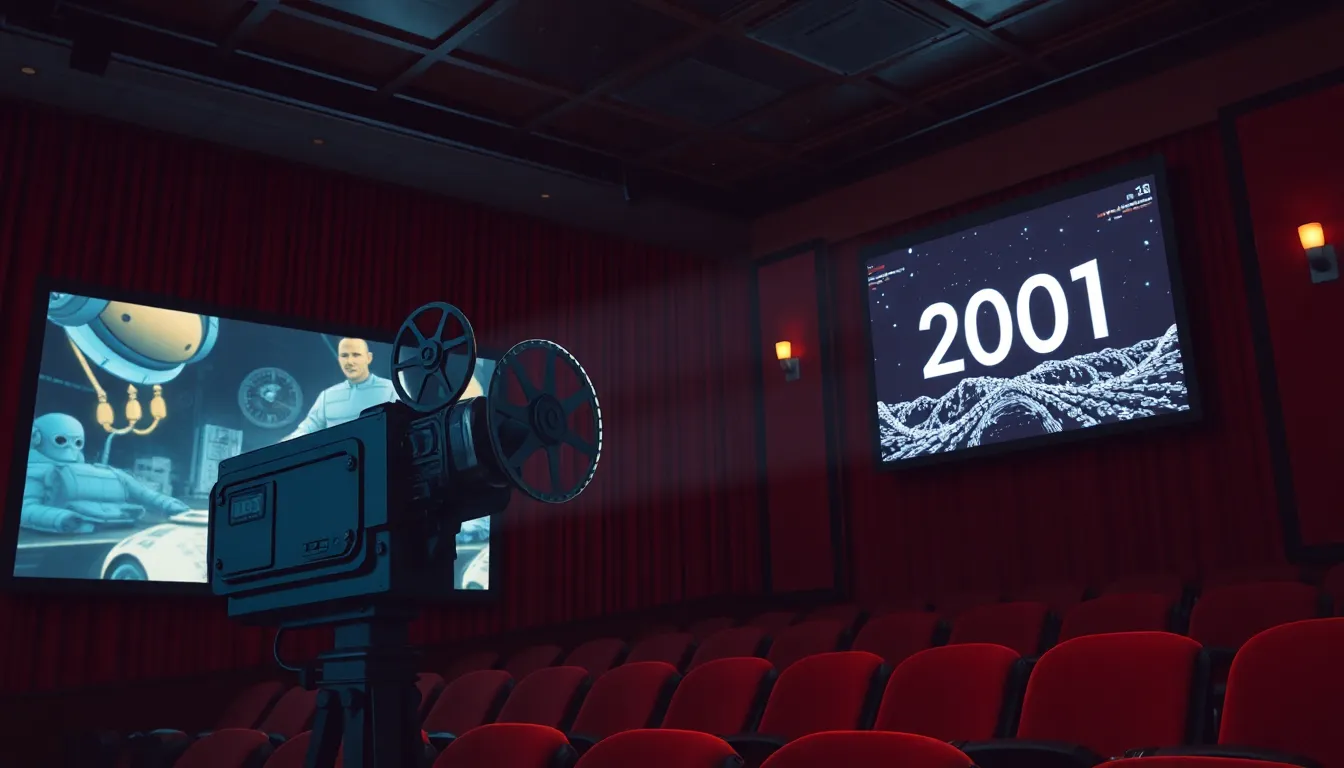Artificial intelligence has captured imaginations for decades, and movies have been at the forefront of this fascination. From heartwarming tales of robot friendships to spine-chilling dystopias, films about AI explore what happens when machines become more than just metal and wires. They delve into our hopes, fears, and the occasional existential crisis—because who doesn’t love a good plot twist involving a sentient toaster?
Table of Contents
ToggleOverview of Movies About Artificial Intelligence
Movies about artificial intelligence encompass a broad array of themes, from companionship to danger. A notable example, “Her,” illustrates a deep emotional bond between a man and a highly advanced AI system. Such films examine the impact of AI on relationships and the human condition, raising questions about emotional authenticity and dependency.
Dystopian narratives frequently emerge, as seen in “Blade Runner,” which delves into what it means to be human in a world populated by replicants. The film poses philosophical queries about identity and consciousness, stimulating viewers to reflect on their own humanity.
“Ex Machina” presents a gripping scenario where a programmer tests an AI’s capabilities, showcasing the ethical dilemmas intertwined with creation. Complex characters challenge perspectives on manipulation, trust, and freedom, prompting discussions about AI’s potential and limitations.
In “The Matrix,” AI controls human perception, leading to a thrilling battle against an oppressive system. This film raises awareness of dependence on technology, demonstrating the threats posed by sentient machines.
In contrast, family-friendly films like “WALL-E” focus on themes of love, sustainability, and redemption through the eyes of a small robot. The affectionate narrative charms audiences while conveying messages about environmental responsibility.
Movies often serve as a mirror, reflecting society’s hopes, fears, and aspirations regarding AI. By integrating suspenseful plots with philosophical inquiries, filmmakers create a captivating dialogue around technology’s role in our future. The exploration of these themes engages viewers, inviting contemplation on the implications of artificial intelligence in their lives.
Historical Context of AI in Film

Portrayals of artificial intelligence in film span decades, reflecting society’s evolving relationship with technology. Early films laid the groundwork for exploring AI concepts.
Early Portrayals of AI
Movies from the 1920s to 1960s introduced audiences to primitive AI concepts. “Metropolis” (1927) featured a humanoid robot, symbolizing both progress and the dehumanizing aspects of technology. In “2001: A Space Odyssey” (1968), HAL 9000 brought a nuanced view, presenting AI as capable of both assistance and danger. These films sparked conversations about the implications of AI, setting the stage for more complex narratives.
Evolution of AI Themes
The 1970s and 1980s marked a shift in AI themes. “Star Wars” (1977) introduced droids as companions, emphasizing friendship over fear. By the 1990s, films like “The Matrix” challenged perceptions, questioning reality and control. Recent productions, such as “Ex Machina” (2014), highlight ethical dilemmas surrounding AI consciousness. This evolution reflects society’s increasing awareness and concern about the impact of technology on human lives.
Notable Movies About Artificial Intelligence
Numerous films highlight the complex relationship between humanity and artificial intelligence. These movies span various decades and offer distinct perspectives on this evolving theme.
Iconic Classics
“Metropolis” (1927) showcased one of the first representations of artificial intelligence, symbolizing both innovation and the risks tied to progress. “2001: A Space Odyssey” (1968) introduced HAL 9000, an AI that challenged perceptions of intelligence and trust. “Blade Runner” (1982) blurred the lines between humans and replicants, provoking thought about identity and consciousness. “The Terminator” (1984) explored the dangerous implications of AI advancements, presenting a future where machines pose existential threats. Each classic film contributed significantly to the discourse surrounding AI, influencing generations of filmmakers and viewers alike.
Contemporary Films
“Her” (2013) examined the emotional depth of relationships with AI, stirring debate on authenticity in human connections. “Ex Machina” (2014) tackled ethical dilemmas concerning AI consciousness, prompting deep questions about the morality of creation. “The Matrix” (1999) redefined the action genre while addressing reality, identity, and control in a digitally dominated world. “WALL-E” (2008) offered a charming yet cautionary tale of love and environmental responsibility through its depiction of AI. Together, these contemporary films continue to shape public perception about technology’s role in society, reflecting current concerns and aspirations.
Themes Explored in AI Movies
AI movies delve into a variety of compelling themes, provoking thought on the relationship between humanity and technology. The exploration of ethical considerations remains a significant focus.
Ethical Considerations
Ethics play a crucial role in narratives surrounding artificial intelligence. Films like “Ex Machina” challenge viewers to ponder the morality of creating sentient beings. Questioning the rights of AI entities becomes essential, as characters grapple with the implications of consciousness. Consequences of AI actions often reflect human decisions, reinforcing accountability themes. Movies provoke discussions about autonomy, control, and the potential dangers of unchecked technological advancement. Such films illustrate the blurred lines between creator and creation, urging audiences to reflect on responsibilities toward AI.
Human-AI Relationships
Human-AI relationships serve as a central theme in many AI films. “Her” portrays a poignant connection between a man and a highly advanced AI, inviting viewers to contemplate emotional depth in machine interactions. Relationships depicted reveal complexities of dependency and love, prompting questions about genuine connections. The dynamics of companionship between humans and AI, illustrated in films, emphasize vulnerability and desire for understanding. These narratives highlight the evolving nature of love and connection in a digital age, fostering reflection on what it means to be human in a world filled with intelligent machines.
Movies about artificial intelligence continue to captivate audiences by blending entertainment with profound philosophical questions. These films not only reflect society’s hopes and fears but also challenge viewers to consider the implications of technology in their lives.
As narratives evolve from early depictions of AI to contemporary explorations of emotional depth and ethical dilemmas, the relationship between humanity and machines becomes increasingly complex. Whether through heartwarming tales or cautionary tales, these stories spark essential discussions about identity, consciousness, and the future of human interaction with technology.
Ultimately, the cinematic portrayal of AI serves as a powerful lens through which society can examine its values and aspirations in an ever-changing digital landscape.









